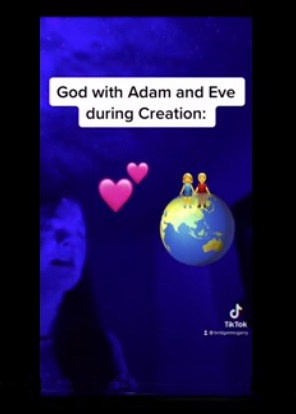
A screenshot shows a frame from a recent TikTok video created by a Little Flower Catholic High School student to illustrate the Genesis creation narrative. Theology instructor Ms. Corridoni encourages her students to explore Scriptures through the use of social media. (TikTok/Courtesy Photo)
An archdiocesan high school teacher is using a teen-oriented social media platform to help her students understand Scripture, and to express the word of God in their own language.
“I meet my students where they’re at,” said Ms. Corridoni, a member of the theology faculty at Little Flower Catholic High School for Girls in Philadelphia.
Since last year, Corridoni has been encouraging her pupils to demonstrate their grasp of biblical texts by recreating the passages on TikTok, a short-form video sharing platform popular with users aged 10 through 29.
In one clip, Corridoni’s students reenact the Exodus narrative at home, with costumes and stage props drawn from household items. A bundled baby doll is laid on a slow-moving treadmill belt to represent the infant Moses floating on the Nile (Ex 2:1-10). Later in the segment, a student depicts Moses drawing water from the rock (Ex 17:1-7) by striking a stone basement wall to produce a stream from an off-camera garden hose.
Corridoni said she was “almost moved to tears” by the ingenuity of some of the projects, especially since most of her freshman students have had “no prior experience with religion,” while “less than half are coming in with a background in Catholicism.”
In contrast, Corridoni said she was “spoiled,” spiritually speaking, by her own upbringing in the faith.
After graduating from Bishop Shanahan High School, she “wanted to spend every day learning more about Christ and talking about Christ.” Enrolling at Rosemont College, Corridoni soon declared a major in both theology and communications, with an initial goal of working in Catholic radio or television.
[hotblock]
But during her junior year, she began to discern a call to the classroom. Corridoni accompanied her mother, a religious education instructor at St. Isaac Jogues Parish in Wayne, on a confirmation pilgrimage to Philadelphia shrines – and found herself fielding questions posed by the teens.
“I spent the day really talking to these students about Christ, and my love for Jesus,” she said. “You can’t hold that back. I enjoyed it so much, and the (things) the students were asking filled me with so much hope.”
Now in her second year on the Little Flower faculty, Corridoni said she stumbled upon TikTok while observing her students before class.
“I would see them in the hallway doing a dance and recording themselves,” she said.
By explaining the ins and outs of the TikTok platform, the teens “quickly brought me into their world,” said Corridoni, who found their confidence and creativity “quite beautiful.”
She also recognized a unique opportunity to reach her students.
“I saw there was something in this medium that they were comfortable with,” she said. “And I thought, if I can come up with an idea to share the word of God in a way that they can comprehend, I think this might be the way.”
Corridoni’s intuition was in harmony with the Second Vatican Council, which decreed that “all the children of the church should join, without delay and with the greatest effort, in a common work to make effective use of the media of social communication” in spreading the Gospel.
Thanks to its digital format, the TikTok assignment has survived the COVID pandemic intact. Students who are uncomfortable with the platform are welcome to instead interpret the Scriptural texts through other media, such as podcasts and visual arts, said Corridoni.
“They took this project and ran with it,” she said – and that was exactly as she had intended.
“It teaches them they are plenty capable of understanding the word of God,” said Corridoni. “They lose their intimidation when they are challenged to modernize it.”
In the process, students discover the enduring wisdom and reassurance of Scripture, she added.
“There’s a temptation to believe that if we’re reading the Old Testament … it’s not relevant today,” she said. “But just as God made promises to the Old Testament people, he makes promises to the people of today as well.”
Reflecting on and then dramatizing the biblical texts also provides the students with “a reality check,” one that brings peace and joy unattainable in a world “that tempts them to mediocrity and settling,” said Corridoni.
“They experience truth, and it teaches them … that they have a calling, a purpose,” she said. “I tell them, ‘You are made to be a saint. You are made in the image of God, and you are carrying a piece of heaven within you.’”
PREVIOUS: Hometown saint shows ‘we too can be holy,’ says priest
NEXT: 50% scholarship for Villanova degree offered to archdiocesan workers



Share this story